Financial Accounting Report: Stakeholders and Financial Statements
VerifiedAdded on 2021/02/20
|8
|1824
|35
Report
AI Summary
This report delves into the realm of financial accounting, emphasizing its crucial role in gathering and analyzing financial information to produce financial statements. The report explores the purpose of financial accounting, which includes presenting financial statements to stakeholders, summarizing financial events, recording financial transactions, estimating financial resources, and aiding in the decision-making process. The study uses the Broad head accountancy firm as a case study to illustrate these concepts. Furthermore, the report differentiates between internal and external stakeholders, defining stakeholders as those with an interest in a company's activities. Internal stakeholders, like managers and the board of directors, are actively involved in daily operations, while external stakeholders, such as investors, suppliers, government, and customers, assess financial performance for investment and other decisions. The report concludes that financial accounting is vital for companies, providing essential information for decision-making and stakeholder assessment. The financial statements are important for both internal and external users of the financial information.

FINANCIAL
ACCOUNTING
ACCOUNTING
Paraphrase This Document
Need a fresh take? Get an instant paraphrase of this document with our AI Paraphraser
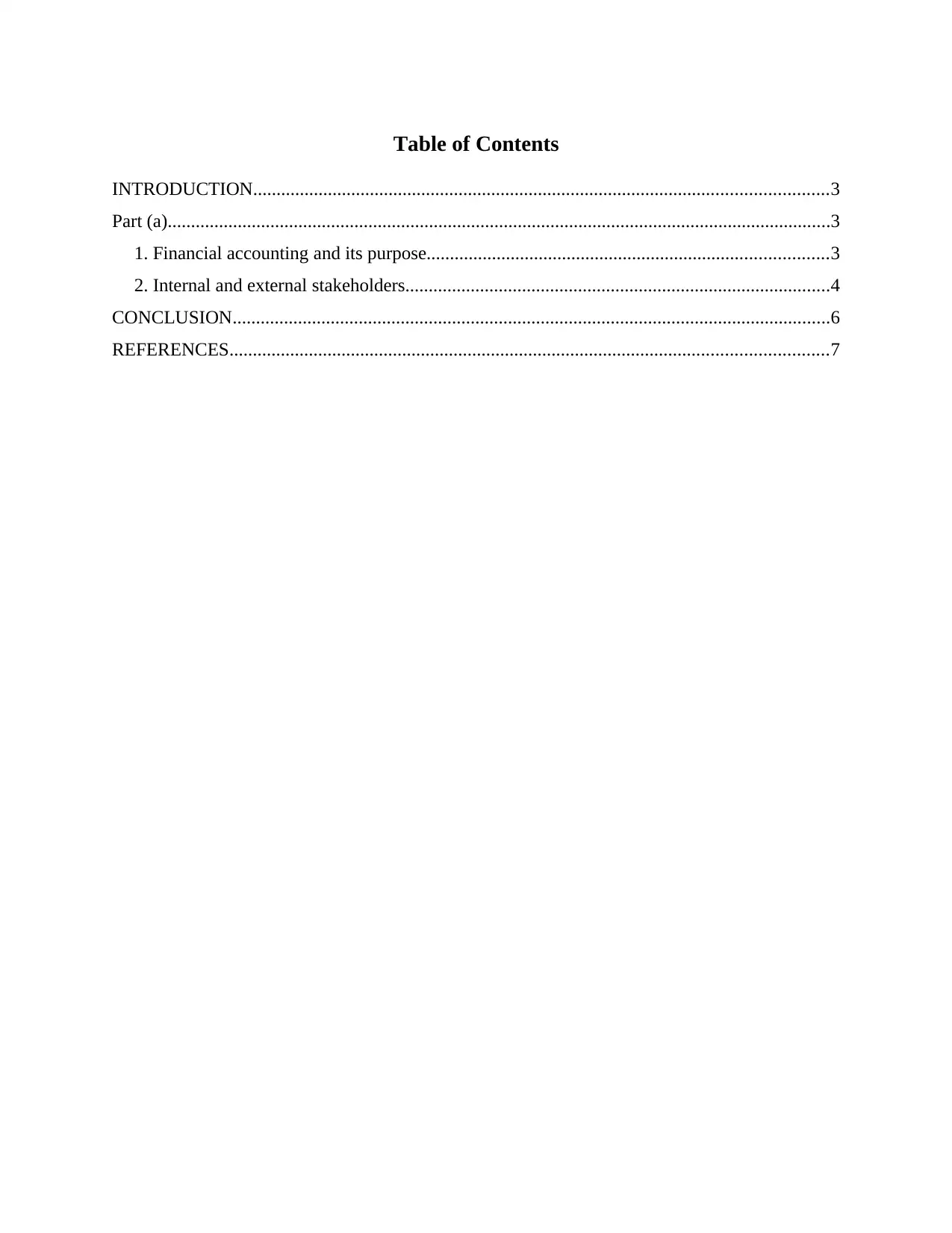
Table of Contents
INTRODUCTION...........................................................................................................................3
Part (a)..............................................................................................................................................3
1. Financial accounting and its purpose......................................................................................3
2. Internal and external stakeholders...........................................................................................4
CONCLUSION................................................................................................................................6
REFERENCES................................................................................................................................7
INTRODUCTION...........................................................................................................................3
Part (a)..............................................................................................................................................3
1. Financial accounting and its purpose......................................................................................3
2. Internal and external stakeholders...........................................................................................4
CONCLUSION................................................................................................................................6
REFERENCES................................................................................................................................7
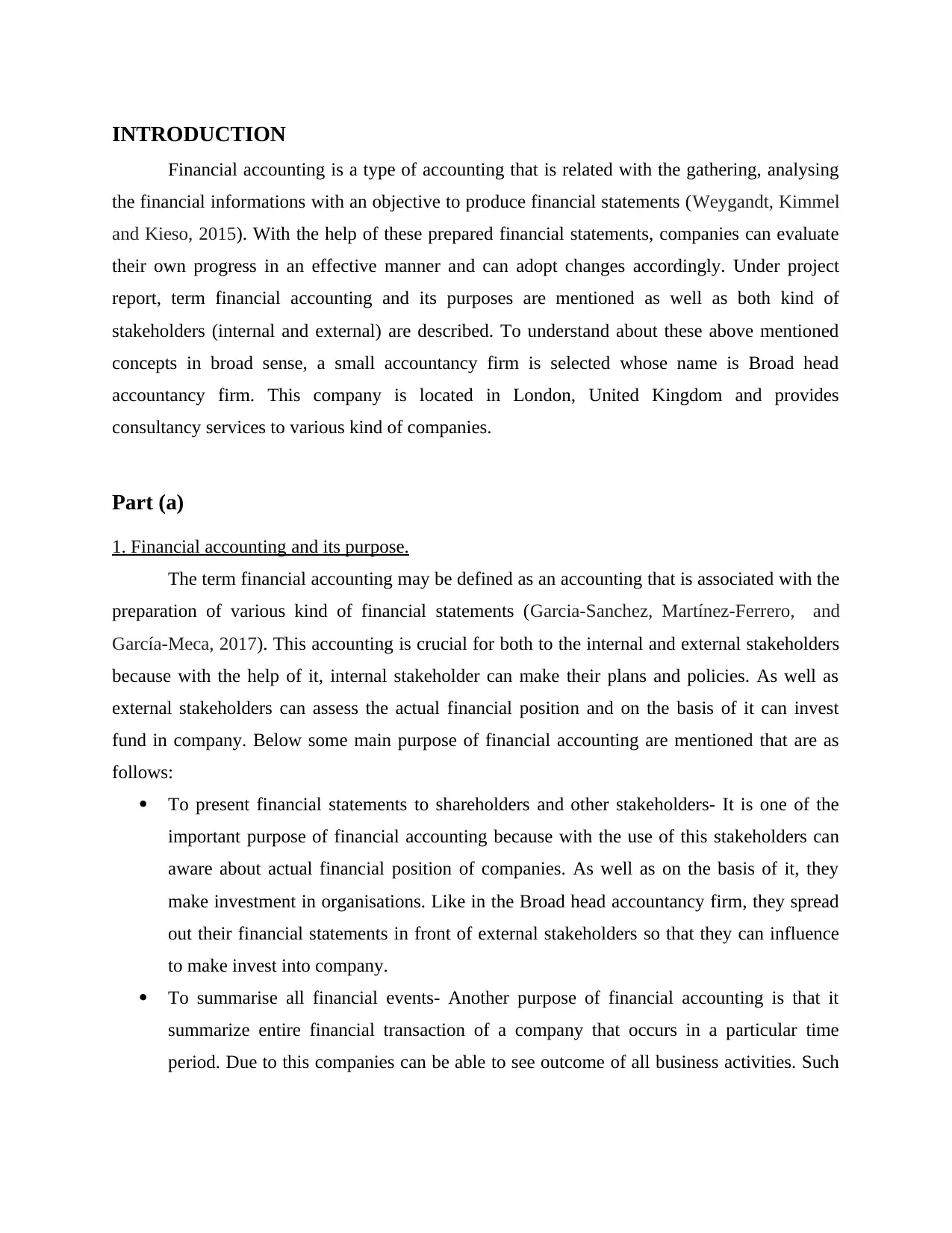
INTRODUCTION
Financial accounting is a type of accounting that is related with the gathering, analysing
the financial informations with an objective to produce financial statements (Weygandt, Kimmel
and Kieso, 2015). With the help of these prepared financial statements, companies can evaluate
their own progress in an effective manner and can adopt changes accordingly. Under project
report, term financial accounting and its purposes are mentioned as well as both kind of
stakeholders (internal and external) are described. To understand about these above mentioned
concepts in broad sense, a small accountancy firm is selected whose name is Broad head
accountancy firm. This company is located in London, United Kingdom and provides
consultancy services to various kind of companies.
Part (a)
1. Financial accounting and its purpose.
The term financial accounting may be defined as an accounting that is associated with the
preparation of various kind of financial statements (Garcia-Sanchez, Martínez-Ferrero, and
García-Meca, 2017). This accounting is crucial for both to the internal and external stakeholders
because with the help of it, internal stakeholder can make their plans and policies. As well as
external stakeholders can assess the actual financial position and on the basis of it can invest
fund in company. Below some main purpose of financial accounting are mentioned that are as
follows:
To present financial statements to shareholders and other stakeholders- It is one of the
important purpose of financial accounting because with the use of this stakeholders can
aware about actual financial position of companies. As well as on the basis of it, they
make investment in organisations. Like in the Broad head accountancy firm, they spread
out their financial statements in front of external stakeholders so that they can influence
to make invest into company.
To summarise all financial events- Another purpose of financial accounting is that it
summarize entire financial transaction of a company that occurs in a particular time
period. Due to this companies can be able to see outcome of all business activities. Such
Financial accounting is a type of accounting that is related with the gathering, analysing
the financial informations with an objective to produce financial statements (Weygandt, Kimmel
and Kieso, 2015). With the help of these prepared financial statements, companies can evaluate
their own progress in an effective manner and can adopt changes accordingly. Under project
report, term financial accounting and its purposes are mentioned as well as both kind of
stakeholders (internal and external) are described. To understand about these above mentioned
concepts in broad sense, a small accountancy firm is selected whose name is Broad head
accountancy firm. This company is located in London, United Kingdom and provides
consultancy services to various kind of companies.
Part (a)
1. Financial accounting and its purpose.
The term financial accounting may be defined as an accounting that is associated with the
preparation of various kind of financial statements (Garcia-Sanchez, Martínez-Ferrero, and
García-Meca, 2017). This accounting is crucial for both to the internal and external stakeholders
because with the help of it, internal stakeholder can make their plans and policies. As well as
external stakeholders can assess the actual financial position and on the basis of it can invest
fund in company. Below some main purpose of financial accounting are mentioned that are as
follows:
To present financial statements to shareholders and other stakeholders- It is one of the
important purpose of financial accounting because with the use of this stakeholders can
aware about actual financial position of companies. As well as on the basis of it, they
make investment in organisations. Like in the Broad head accountancy firm, they spread
out their financial statements in front of external stakeholders so that they can influence
to make invest into company.
To summarise all financial events- Another purpose of financial accounting is that it
summarize entire financial transaction of a company that occurs in a particular time
period. Due to this companies can be able to see outcome of all business activities. Such
⊘ This is a preview!⊘
Do you want full access?
Subscribe today to unlock all pages.

Trusted by 1+ million students worldwide
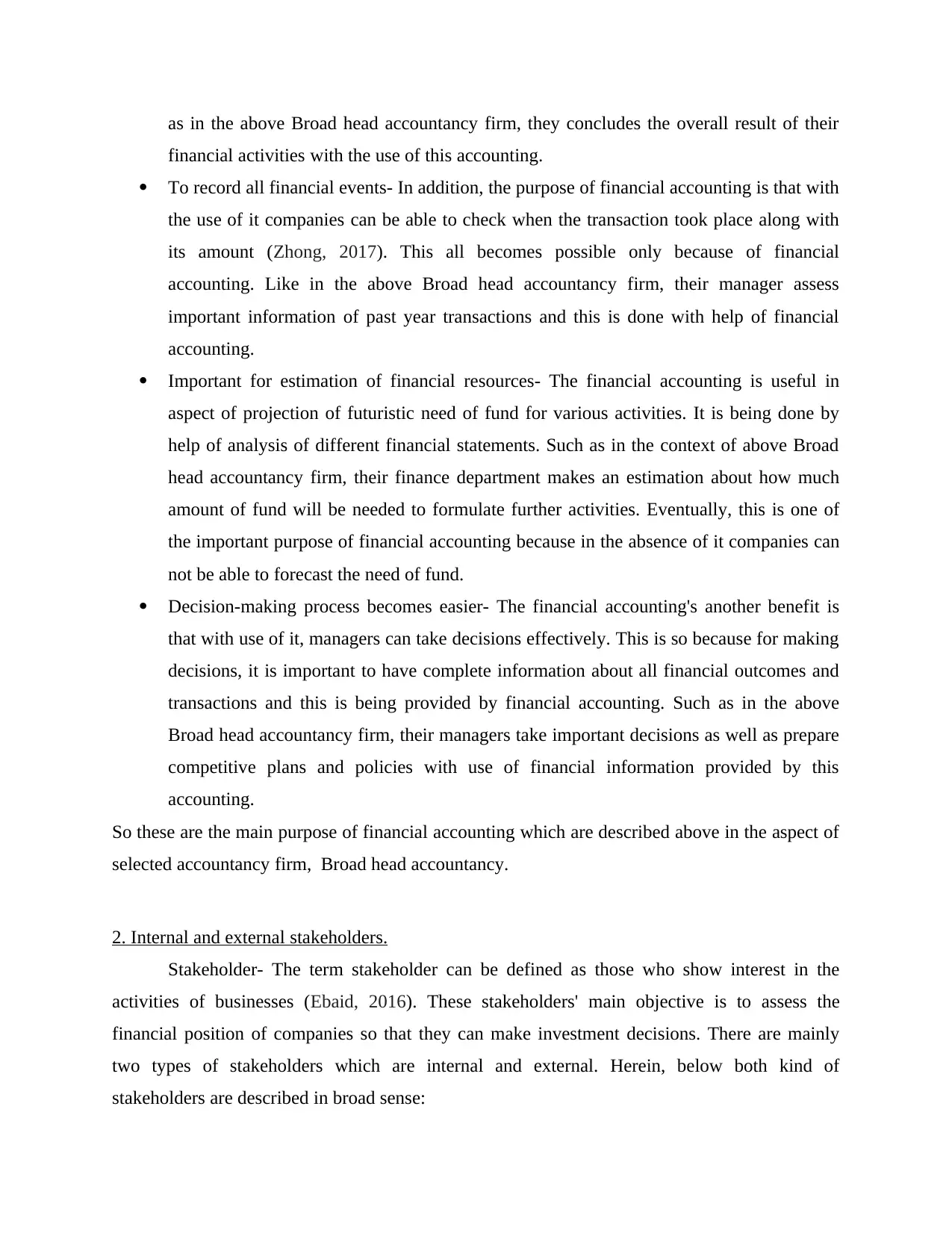
as in the above Broad head accountancy firm, they concludes the overall result of their
financial activities with the use of this accounting.
To record all financial events- In addition, the purpose of financial accounting is that with
the use of it companies can be able to check when the transaction took place along with
its amount (Zhong, 2017). This all becomes possible only because of financial
accounting. Like in the above Broad head accountancy firm, their manager assess
important information of past year transactions and this is done with help of financial
accounting.
Important for estimation of financial resources- The financial accounting is useful in
aspect of projection of futuristic need of fund for various activities. It is being done by
help of analysis of different financial statements. Such as in the context of above Broad
head accountancy firm, their finance department makes an estimation about how much
amount of fund will be needed to formulate further activities. Eventually, this is one of
the important purpose of financial accounting because in the absence of it companies can
not be able to forecast the need of fund.
Decision-making process becomes easier- The financial accounting's another benefit is
that with use of it, managers can take decisions effectively. This is so because for making
decisions, it is important to have complete information about all financial outcomes and
transactions and this is being provided by financial accounting. Such as in the above
Broad head accountancy firm, their managers take important decisions as well as prepare
competitive plans and policies with use of financial information provided by this
accounting.
So these are the main purpose of financial accounting which are described above in the aspect of
selected accountancy firm, Broad head accountancy.
2. Internal and external stakeholders.
Stakeholder- The term stakeholder can be defined as those who show interest in the
activities of businesses (Ebaid, 2016). These stakeholders' main objective is to assess the
financial position of companies so that they can make investment decisions. There are mainly
two types of stakeholders which are internal and external. Herein, below both kind of
stakeholders are described in broad sense:
financial activities with the use of this accounting.
To record all financial events- In addition, the purpose of financial accounting is that with
the use of it companies can be able to check when the transaction took place along with
its amount (Zhong, 2017). This all becomes possible only because of financial
accounting. Like in the above Broad head accountancy firm, their manager assess
important information of past year transactions and this is done with help of financial
accounting.
Important for estimation of financial resources- The financial accounting is useful in
aspect of projection of futuristic need of fund for various activities. It is being done by
help of analysis of different financial statements. Such as in the context of above Broad
head accountancy firm, their finance department makes an estimation about how much
amount of fund will be needed to formulate further activities. Eventually, this is one of
the important purpose of financial accounting because in the absence of it companies can
not be able to forecast the need of fund.
Decision-making process becomes easier- The financial accounting's another benefit is
that with use of it, managers can take decisions effectively. This is so because for making
decisions, it is important to have complete information about all financial outcomes and
transactions and this is being provided by financial accounting. Such as in the above
Broad head accountancy firm, their managers take important decisions as well as prepare
competitive plans and policies with use of financial information provided by this
accounting.
So these are the main purpose of financial accounting which are described above in the aspect of
selected accountancy firm, Broad head accountancy.
2. Internal and external stakeholders.
Stakeholder- The term stakeholder can be defined as those who show interest in the
activities of businesses (Ebaid, 2016). These stakeholders' main objective is to assess the
financial position of companies so that they can make investment decisions. There are mainly
two types of stakeholders which are internal and external. Herein, below both kind of
stakeholders are described in broad sense:
Paraphrase This Document
Need a fresh take? Get an instant paraphrase of this document with our AI Paraphraser
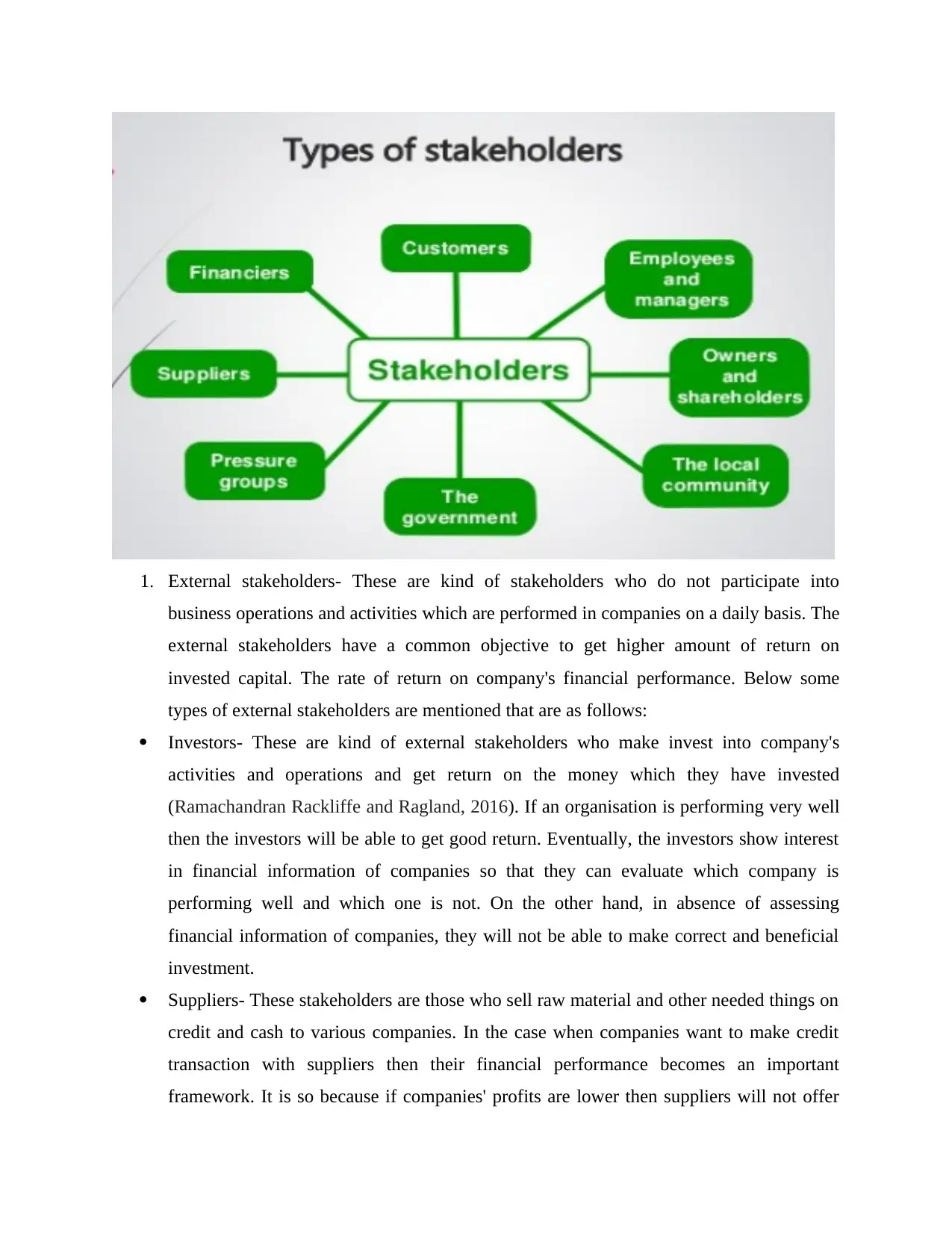
1. External stakeholders- These are kind of stakeholders who do not participate into
business operations and activities which are performed in companies on a daily basis. The
external stakeholders have a common objective to get higher amount of return on
invested capital. The rate of return on company's financial performance. Below some
types of external stakeholders are mentioned that are as follows:
Investors- These are kind of external stakeholders who make invest into company's
activities and operations and get return on the money which they have invested
(Ramachandran Rackliffe and Ragland, 2016). If an organisation is performing very well
then the investors will be able to get good return. Eventually, the investors show interest
in financial information of companies so that they can evaluate which company is
performing well and which one is not. On the other hand, in absence of assessing
financial information of companies, they will not be able to make correct and beneficial
investment.
Suppliers- These stakeholders are those who sell raw material and other needed things on
credit and cash to various companies. In the case when companies want to make credit
transaction with suppliers then their financial performance becomes an important
framework. It is so because if companies' profits are lower then suppliers will not offer
business operations and activities which are performed in companies on a daily basis. The
external stakeholders have a common objective to get higher amount of return on
invested capital. The rate of return on company's financial performance. Below some
types of external stakeholders are mentioned that are as follows:
Investors- These are kind of external stakeholders who make invest into company's
activities and operations and get return on the money which they have invested
(Ramachandran Rackliffe and Ragland, 2016). If an organisation is performing very well
then the investors will be able to get good return. Eventually, the investors show interest
in financial information of companies so that they can evaluate which company is
performing well and which one is not. On the other hand, in absence of assessing
financial information of companies, they will not be able to make correct and beneficial
investment.
Suppliers- These stakeholders are those who sell raw material and other needed things on
credit and cash to various companies. In the case when companies want to make credit
transaction with suppliers then their financial performance becomes an important
framework. It is so because if companies' profits are lower then suppliers will not offer
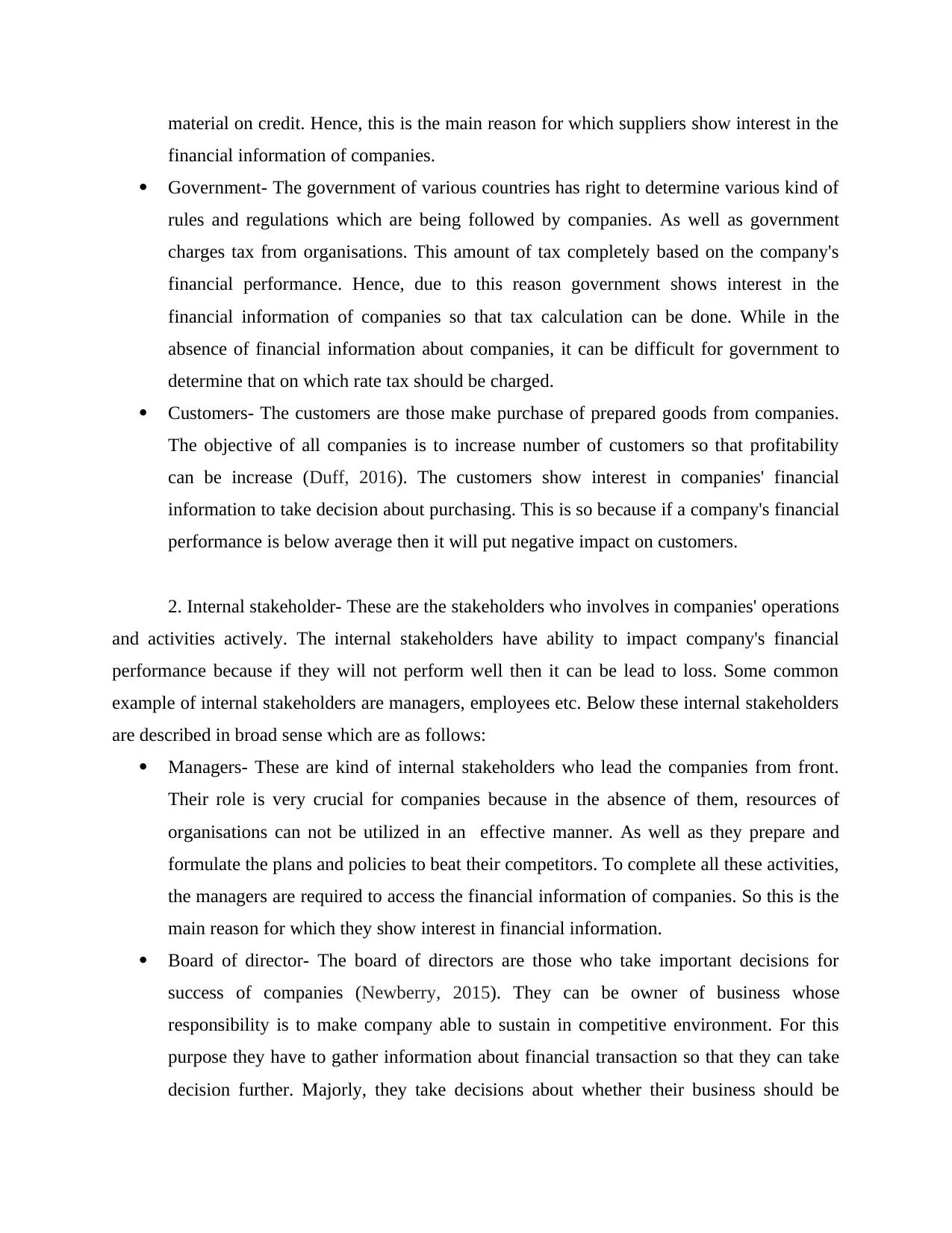
material on credit. Hence, this is the main reason for which suppliers show interest in the
financial information of companies.
Government- The government of various countries has right to determine various kind of
rules and regulations which are being followed by companies. As well as government
charges tax from organisations. This amount of tax completely based on the company's
financial performance. Hence, due to this reason government shows interest in the
financial information of companies so that tax calculation can be done. While in the
absence of financial information about companies, it can be difficult for government to
determine that on which rate tax should be charged.
Customers- The customers are those make purchase of prepared goods from companies.
The objective of all companies is to increase number of customers so that profitability
can be increase (Duff, 2016). The customers show interest in companies' financial
information to take decision about purchasing. This is so because if a company's financial
performance is below average then it will put negative impact on customers.
2. Internal stakeholder- These are the stakeholders who involves in companies' operations
and activities actively. The internal stakeholders have ability to impact company's financial
performance because if they will not perform well then it can be lead to loss. Some common
example of internal stakeholders are managers, employees etc. Below these internal stakeholders
are described in broad sense which are as follows:
Managers- These are kind of internal stakeholders who lead the companies from front.
Their role is very crucial for companies because in the absence of them, resources of
organisations can not be utilized in an effective manner. As well as they prepare and
formulate the plans and policies to beat their competitors. To complete all these activities,
the managers are required to access the financial information of companies. So this is the
main reason for which they show interest in financial information.
Board of director- The board of directors are those who take important decisions for
success of companies (Newberry, 2015). They can be owner of business whose
responsibility is to make company able to sustain in competitive environment. For this
purpose they have to gather information about financial transaction so that they can take
decision further. Majorly, they take decisions about whether their business should be
financial information of companies.
Government- The government of various countries has right to determine various kind of
rules and regulations which are being followed by companies. As well as government
charges tax from organisations. This amount of tax completely based on the company's
financial performance. Hence, due to this reason government shows interest in the
financial information of companies so that tax calculation can be done. While in the
absence of financial information about companies, it can be difficult for government to
determine that on which rate tax should be charged.
Customers- The customers are those make purchase of prepared goods from companies.
The objective of all companies is to increase number of customers so that profitability
can be increase (Duff, 2016). The customers show interest in companies' financial
information to take decision about purchasing. This is so because if a company's financial
performance is below average then it will put negative impact on customers.
2. Internal stakeholder- These are the stakeholders who involves in companies' operations
and activities actively. The internal stakeholders have ability to impact company's financial
performance because if they will not perform well then it can be lead to loss. Some common
example of internal stakeholders are managers, employees etc. Below these internal stakeholders
are described in broad sense which are as follows:
Managers- These are kind of internal stakeholders who lead the companies from front.
Their role is very crucial for companies because in the absence of them, resources of
organisations can not be utilized in an effective manner. As well as they prepare and
formulate the plans and policies to beat their competitors. To complete all these activities,
the managers are required to access the financial information of companies. So this is the
main reason for which they show interest in financial information.
Board of director- The board of directors are those who take important decisions for
success of companies (Newberry, 2015). They can be owner of business whose
responsibility is to make company able to sustain in competitive environment. For this
purpose they have to gather information about financial transaction so that they can take
decision further. Majorly, they take decisions about whether their business should be
⊘ This is a preview!⊘
Do you want full access?
Subscribe today to unlock all pages.

Trusted by 1+ million students worldwide
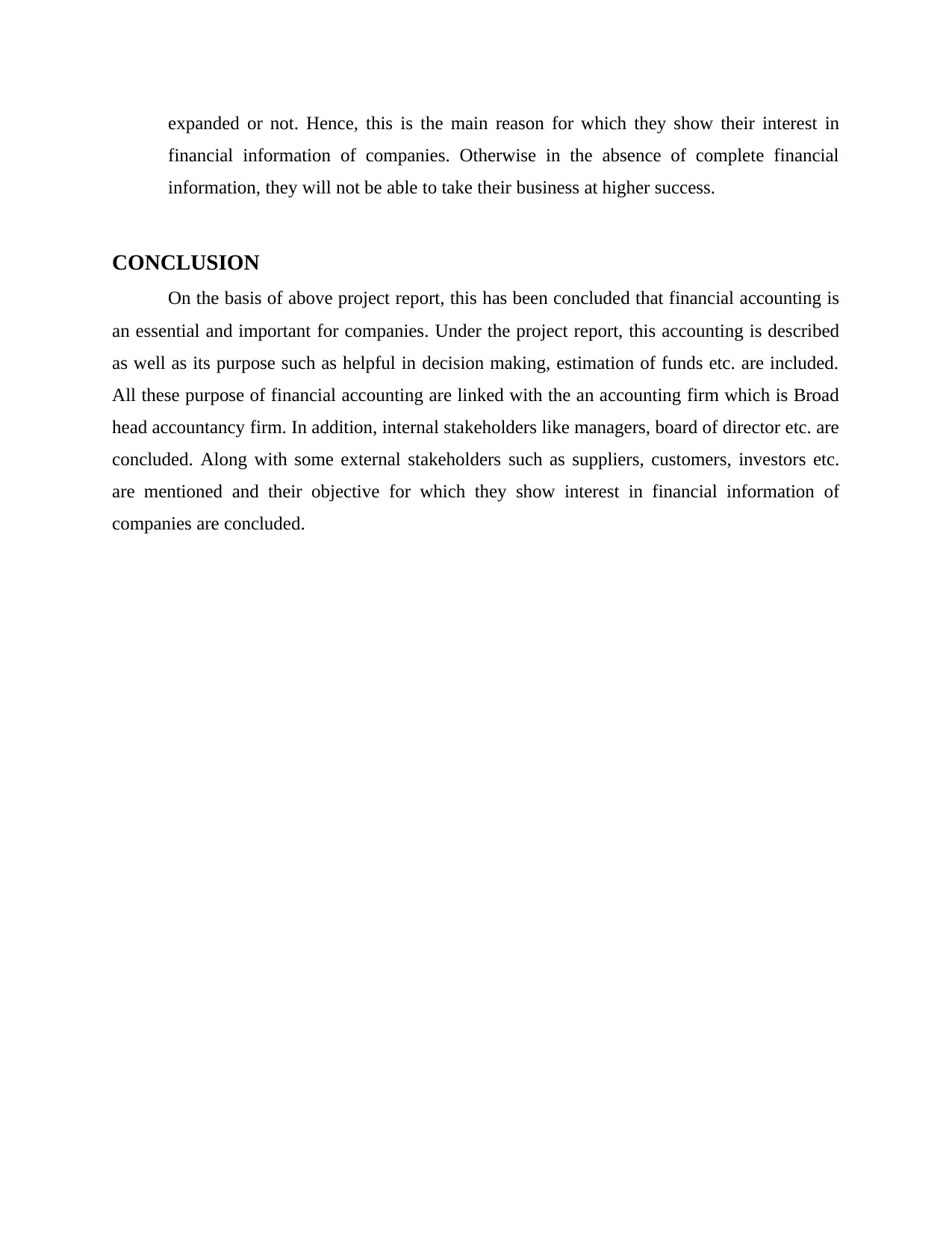
expanded or not. Hence, this is the main reason for which they show their interest in
financial information of companies. Otherwise in the absence of complete financial
information, they will not be able to take their business at higher success.
CONCLUSION
On the basis of above project report, this has been concluded that financial accounting is
an essential and important for companies. Under the project report, this accounting is described
as well as its purpose such as helpful in decision making, estimation of funds etc. are included.
All these purpose of financial accounting are linked with the an accounting firm which is Broad
head accountancy firm. In addition, internal stakeholders like managers, board of director etc. are
concluded. Along with some external stakeholders such as suppliers, customers, investors etc.
are mentioned and their objective for which they show interest in financial information of
companies are concluded.
financial information of companies. Otherwise in the absence of complete financial
information, they will not be able to take their business at higher success.
CONCLUSION
On the basis of above project report, this has been concluded that financial accounting is
an essential and important for companies. Under the project report, this accounting is described
as well as its purpose such as helpful in decision making, estimation of funds etc. are included.
All these purpose of financial accounting are linked with the an accounting firm which is Broad
head accountancy firm. In addition, internal stakeholders like managers, board of director etc. are
concluded. Along with some external stakeholders such as suppliers, customers, investors etc.
are mentioned and their objective for which they show interest in financial information of
companies are concluded.
Paraphrase This Document
Need a fresh take? Get an instant paraphrase of this document with our AI Paraphraser
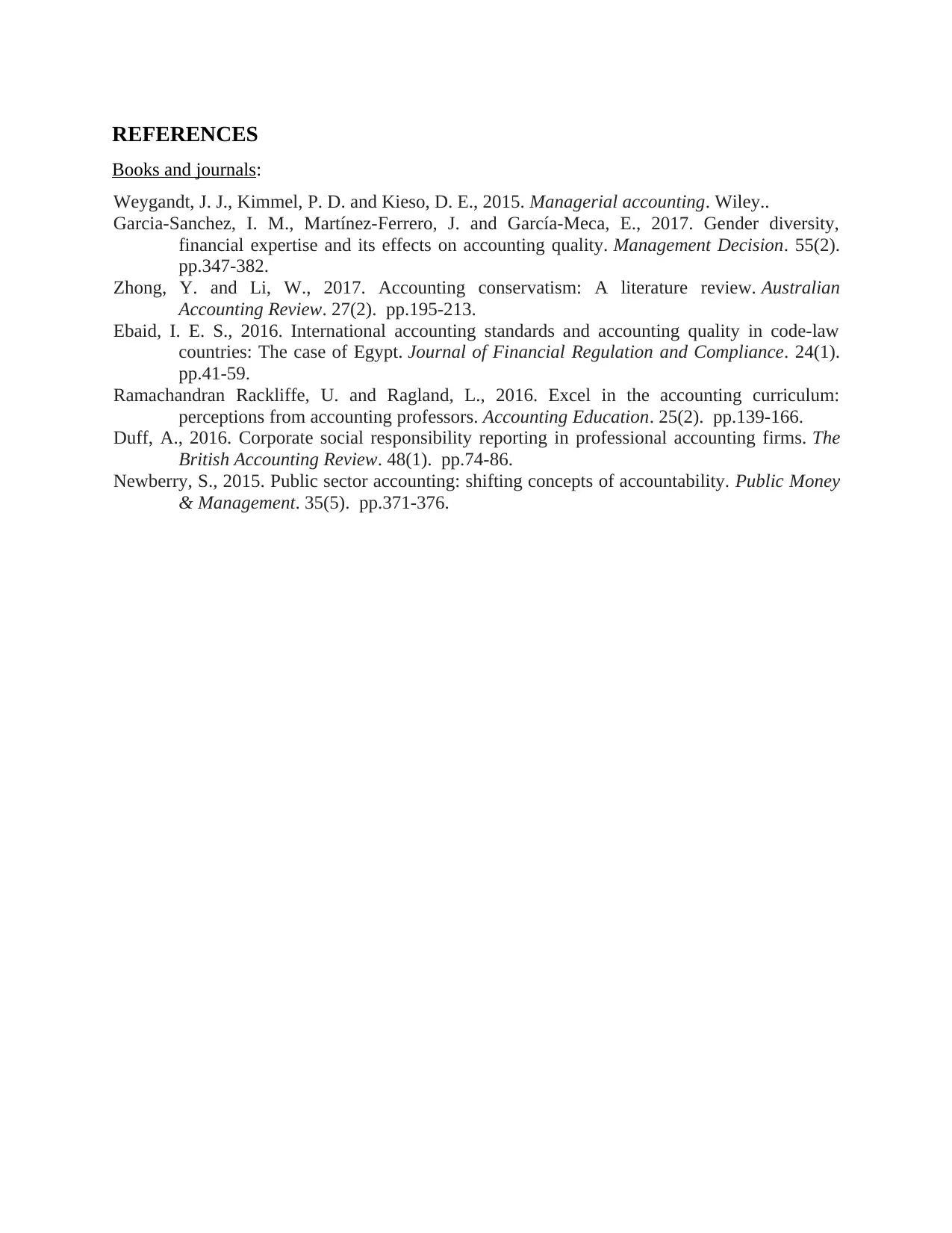
REFERENCES
Books and journals:
Weygandt, J. J., Kimmel, P. D. and Kieso, D. E., 2015. Managerial accounting. Wiley..
Garcia-Sanchez, I. M., Martínez-Ferrero, J. and García-Meca, E., 2017. Gender diversity,
financial expertise and its effects on accounting quality. Management Decision. 55(2).
pp.347-382.
Zhong, Y. and Li, W., 2017. Accounting conservatism: A literature review. Australian
Accounting Review. 27(2). pp.195-213.
Ebaid, I. E. S., 2016. International accounting standards and accounting quality in code-law
countries: The case of Egypt. Journal of Financial Regulation and Compliance. 24(1).
pp.41-59.
Ramachandran Rackliffe, U. and Ragland, L., 2016. Excel in the accounting curriculum:
perceptions from accounting professors. Accounting Education. 25(2). pp.139-166.
Duff, A., 2016. Corporate social responsibility reporting in professional accounting firms. The
British Accounting Review. 48(1). pp.74-86.
Newberry, S., 2015. Public sector accounting: shifting concepts of accountability. Public Money
& Management. 35(5). pp.371-376.
Books and journals:
Weygandt, J. J., Kimmel, P. D. and Kieso, D. E., 2015. Managerial accounting. Wiley..
Garcia-Sanchez, I. M., Martínez-Ferrero, J. and García-Meca, E., 2017. Gender diversity,
financial expertise and its effects on accounting quality. Management Decision. 55(2).
pp.347-382.
Zhong, Y. and Li, W., 2017. Accounting conservatism: A literature review. Australian
Accounting Review. 27(2). pp.195-213.
Ebaid, I. E. S., 2016. International accounting standards and accounting quality in code-law
countries: The case of Egypt. Journal of Financial Regulation and Compliance. 24(1).
pp.41-59.
Ramachandran Rackliffe, U. and Ragland, L., 2016. Excel in the accounting curriculum:
perceptions from accounting professors. Accounting Education. 25(2). pp.139-166.
Duff, A., 2016. Corporate social responsibility reporting in professional accounting firms. The
British Accounting Review. 48(1). pp.74-86.
Newberry, S., 2015. Public sector accounting: shifting concepts of accountability. Public Money
& Management. 35(5). pp.371-376.
1 out of 8
Related Documents
Your All-in-One AI-Powered Toolkit for Academic Success.
+13062052269
info@desklib.com
Available 24*7 on WhatsApp / Email
![[object Object]](/_next/static/media/star-bottom.7253800d.svg)
Unlock your academic potential
Copyright © 2020–2025 A2Z Services. All Rights Reserved. Developed and managed by ZUCOL.




